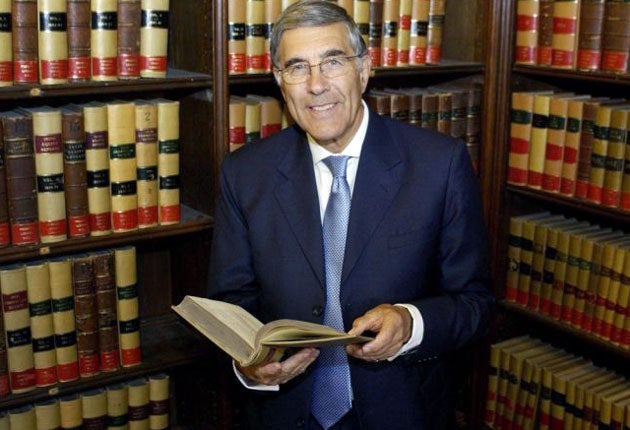Law chief: too many people are locked up
New head of Supreme Court blames Government for overcrowded prisons

Controversial public protection sentences and inadequate penal funding have combined to drive up the record numbers of people being kept in prisons, the president of the new Supreme Court has warned.
Lord Phillips, who next month leads a panel hearing the first case to go before the court, said under-resourcing was "a very serious problem" facing prisons in England and Wales and he renewed his call for a greater use of community alternatives to jail.
This month the prison population hit a record high of 84,442, despite more than 60,000 inmates benefiting from an early release scheme introduced in June 2007.
In an interview with The Independent, Lord Phillips said: "The reasons for the rise in the prison population are quite complex but there is no doubt it has been steadily growing and the forecast is that this trend will continue. Certainly some criminal legislation dealing with sentencing has had the effect of imposing longer sentences or sentences which keep people in prison until they demonstrate they are no longer dangerous."
Of particular concern has been the new indeterminate sentence for public protection (IPP), brought in four years ago. Last week the Prison Governors' Association and the Liberal Democrats said that hundreds of convicts who could be released were being held in jails because the Government had failed to pay for enough drug treatment and rehabilitation courses.
Yesterday Lord Phillips said he also had reservations about the IPP sentence which includes a minimum term, after which the prisoner has to show that he or she is suitable for release.
The judge said that he knew the legislation had been changed to meet some of the concerns but that he was not "conversant" with the latest figures regarding prisoners detained beyond their minimum sentence. The Government says a further £3m has been made available to help with resourcing IPPs.
"When I was involved it was apparent there was a resource problem when dealing with IPP prisoners in relation to giving them the rehabilitation that they needed in order to be in a position to demonstrate they were no longer a danger, and also there was a problem with the resources of the parole board in considering whether or not they ought to be released."
He added: "Prisons have to be provided for those who judges send to prison. What governs the overall prison population is a complicated question and legislation dealing with sentencing can increase or decrease a prison population."
He explained: "I have always been in favour of alternatives to custody where that course is open to the judge."
In July, Lord Phillips headed a panel of judges who ruled that the Director of Public Prosecutions, Keir Starmer, must publish guidelines on assisted suicide prosecutions after a legal challenge by Debbie Purdy, a multiple sclerosis sufferer. On Tuesday Mr Starmer set out his new policy.
The Supreme Court chief justice said he had only read a summary of the guidance in the newspapers but was satisfied that Mr Starmer had complied with the ruling.
"Our judgment should be left to speak for itself but we did not dictate to him what guidelines he should lay down. What we required was that there should be guidelines to clarify his policy."
Had these guidelines changed the law or merely clarified it? "I don't think I am going to enter into this kind of discussion. It seems to me that the guidelines have done what guidelines are intended to do, which is to clarify the policy in relation to prosecutions."
Lord Phillips has been criticised for expressing a personal view about Mrs Purdy's plight after he had ruled on the case. But he rejects any suggestion that this was evidence of bias on his part.
"I did not make a comment about our original judgment, I was asked point blank for a personal view in relation to a person who commits suicide. I was not making any statement in relation to those who assist suicide; I was expressing sympathy with somebody in the predicament that Mrs Purdy might find herself."
He added: "All judges recognise that they have to be very careful about what views they express in public."
Next month, the Supreme Court will open after a £50m refurbishment of the Middlesex Guildhall in Parliament Square.
The first case concerns a high-profile challenge to anti-terror laws that may have breached the human rights of British citizens who have found themselves financially blacklisted and their assets frozen.
Lord Phillips said the decision to make that the first case was in part his.
"We had discussions about which case we should take as the first case and we wanted to take one that had some general importance," he said.
"It is a case which I think the public will find interesting. It's one of a number of cases which we have had to deal with where there may be a tension of human rights on the one hand and dealing with the challenge of terrorism on the other."
Join our commenting forum
Join thought-provoking conversations, follow other Independent readers and see their replies
Comments
Bookmark popover
Removed from bookmarks